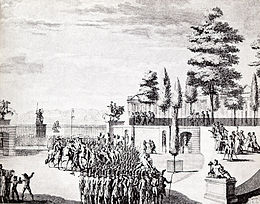- Coup of 18 Fructidor
-
 Acting for the coup's leaders, General Pierre Augereau stormed the Tuileries Palace to arrest Charles Pichegru and others accused of plotting a counter-revolution.
Acting for the coup's leaders, General Pierre Augereau stormed the Tuileries Palace to arrest Charles Pichegru and others accused of plotting a counter-revolution.
The Coup of 18 Fructidor, Year V, was a seizure of power by members of the French Directory on 4 September 1797. Three Directors, Barras, Rewbell and La Révellière-Lépeaux, staged the coup d'etat with support from the military.[1] Moderates and royalist deputies had gained significantly in the recent elections, and the existing government was concerned for their newfound strength. Charles Pichegru, a figure widely assumed to be acting in sympathy to the monarchy and its restoration, was elected President of the Council of Five Hundred.[1] After documentation of Pichegru's treasonous activities was supplied (by Napoleon Bonaparte), the Directors accused the entire body of plotting against the Revolution and moved quickly to annul the elections and arrest the royalists.[1]
To support the coup, General Lazare Hoche, then commander of the Army of Sambre-et-Meuse, arrived in the capital with his troops, while Napoleon sent an army under General Augereau. Deputies were arrested and many were exiled to Cayenne in French Guiana. The chambers were purged, and elections were partly canceled, marking a rise of executive power at the expense of that of the legislative.
Some of the deputies, notably including Pichegru, Barbé-Marbois and Barthélemy, were deported to Cayenne. Carnot made good his escape. The two vacant places in the Directory were filled by Merlin de Douai and Nicolas-Louis François de Neufchâteau. Then the government frankly returned to Jacobin methods. The law against the relatives of émigrés was reenacted, and military tribunals were established to condemn émigrés who should return to France.
The nonjuring priests were again persecuted. Many hundreds were either sent to Cayenne or imprisoned in the hulks of Ré and Oléron. La Révellière Lépeaux seized the opportunity to propagate his religion. Many churches were turned into Theophilanthropic temples. The government strained its power to secure the recognition of the décadi as the day of public worship and the non-observance of Sunday. Freedom of the press ceased, newspapers were confiscated and journalists were deported in large numbers. It was proposed to banish from France all members of the old noblesse. Although the proposal was dropped, they were all declared to be foreigners and were forced to obtain naturalisation in order to enjoy the rights of other citizens. A formal bankruptcy of the state, the cancelling of two-thirds of the interest on the public debt, crowned the misgovernment of this disastrous time.
The 80-gun ship of the line Foudroyant was briefly named Dix-huit fructidor in honour of the event.
Notes
References
- (French) Site sur A-D Laffon de Ladebat
- (French) Site sur le coup d'état du 18 fructidor
- (French) "Les pionniers de la guillotine sèche en Guyane française sous le Directoire" Philippe de Ladebat, éd. Amalthée Nantes, 2008
Categories:- 1797 events of the French Revolution
- Military coups in France
Wikimedia Foundation. 2010.
